Last week I attended 9Marks’ “First Five Years” conference in Ft. Worth. From my perspective, Garret Kell’s message on “Making Changes” was probably the most rewarding talk of all. It’s full of biblical truth and practical wisdom. Every pastor, whether or not he’s in the first five years of ministry, will find encouragement aplenty.
Category Archives: 9Marks
9Marks Mailbag
 In case you’ve missed it, 9Marks has been running a weekly feature since early March named “The 9Marks Mailbag.” Every Friday morning Jonathan Leeman offers “counsel on questions that [are] wide-ranging, practical, and from actual readers in the throes of actual dilemmas.” You may not always agree with the particulars of his counsel, but Leeman does a fantastic job in thinking through every question with biblically informed wisdom.
In case you’ve missed it, 9Marks has been running a weekly feature since early March named “The 9Marks Mailbag.” Every Friday morning Jonathan Leeman offers “counsel on questions that [are] wide-ranging, practical, and from actual readers in the throes of actual dilemmas.” You may not always agree with the particulars of his counsel, but Leeman does a fantastic job in thinking through every question with biblically informed wisdom.
Check out the Mailbags, with their specific questions, in the links below:
Mailbag #1: Lent, Mid-Life Pastor, & Elder Agenda
Mailbag #2: Deaconess Qualifications, Private Baptisms, Knowing Members’ Giving
Mailbag #3: Plagiarizing Pastor, Membership Interview
Mailbag #4: Gospel Culture, Elders and Porn
Mailbag #5: Not Baptizing Children, Small Groups, Elders and Porn—Again
Mailbag #6: Pastors’ Wives, Taking Oaths, Pastors & Administration Work
Mailbag #7: Cake-baking Principles; Two Services or One; Youth Pastors; & A Discipline Issue
11 Things We Want to Be True
 Over the weekend I finished Mark Dever and Jamie Dunlop’s excellent The Compelling Community: Where God’s Power Makes a Church Attractive. Whereas The Deliberate Church aims to set a foundation for healthy church, The Compelling Community is something like a sequel that tries to let us know—as difficult as it can be—what a healthy church feels like.
Over the weekend I finished Mark Dever and Jamie Dunlop’s excellent The Compelling Community: Where God’s Power Makes a Church Attractive. Whereas The Deliberate Church aims to set a foundation for healthy church, The Compelling Community is something like a sequel that tries to let us know—as difficult as it can be—what a healthy church feels like.
The book is stocked with all kinds of wisdom for pastors and church leaders. Once section I found particularly compelling came in the chapter on “Pray[ing] Together as a Community.” Jamie gives a list of elements of a church culture he hopes will increasingly characterize his church (Capitol Hill Baptist Church). I’m sure you’d agree that each one is worth focus in your prayer ministry, both personal and corporate.
11 Things We Want to Characterize Our Church
- Pray for our witness of unity in diversity.
- Pray for our daily lives this week at work and at home. Pray that we would do what is good, honor God, and commend the gospel.
- Pray that we would see relationships in the local church as part of what it means to be a Christian.
- Pray that we would understand the need to make our relationships at church transparent, to be willing to tell embarrassing things about ourselves and to ask awkward questions when needed.
- Pray that we would expect conversations with other church members to be deep, and often theological in nature.
- Prayer that we would think it important to encourage one another with Scripture.
- Pray that we would see part of being a Christian as being a provider, not a consumer.
- Pray that we would not see service in the local church as being primarily about meeting our own felt needs by utilizing our giftedness but about bringing God glory.
- Pray that we would see it as unusual when the local church isn’t the focal point of much of our energy and ambition.
- Pray that we would see it as unusual when a member’s life seems to keep church on the periphery.
- Pray that we would see hospitality as an important part of being a Christian.
If you want an enormous amount of practical encouragement for your ministry make sure and grab a copy of The Compelling Church today.
Book to Look For: On the Church
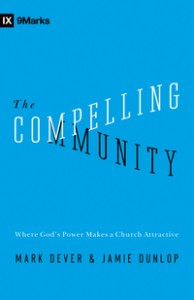 On of my favorite books on ecclesiology is The Deliberate Church by Paul Alexander and Mark Dever.
On of my favorite books on ecclesiology is The Deliberate Church by Paul Alexander and Mark Dever.
I’ve always thought of it as a “Best Of” volume on all things 9Marks, for it presents a sweeping ecclesiological vision on everything from polity, to worship, to running elders meetings. Yet, if The Deliberate Church lacks anything it is extended discussion on the nitty-gritty of a church life together.
Enter The Compelling Community.
A COMPANION FOR THE DELIBERATE CHURCH
Someone told me this forthcoming book by Dever and Jamie Dunlop (an Associate Pastor at Dever’s church) is something of a companion volume to The Deliberate Church. Where the first book constructed a foundation on which the church can stand, this new book seeks to build pillars and buttresses of truth for church life. Here’s what Crossway says:
The local church is meant to embody the vibrant diversity of the global church, transcending racial, cultural, and economic boundaries. Yet local churches too often simply reflect the same societal divisions prevalent in our world today—making them more akin to social clubs filled with like-minded people than the supernatural community the New Testament prescribes. Pastors Mark Dever and Jamie Dunlop argue that authentic fellowship is made up of two crucial ingredients: commitment (depth) and diversity (breadth). Theologically rooted yet extremely practical, this book sets forth basic principles that will help pastors guide their churches toward the compelling community that we all long for.
The Compelling Community is due to land on April 30th.
Read ‘Em All
 I try to let most of my reading focus on works from the pens of men who’ve long lay in the ashes.
I try to let most of my reading focus on works from the pens of men who’ve long lay in the ashes.
But every so often a contemporary author comes along and has a kind of winsome wisdom that demands attention. One man who falls squarely into that category is Jonathan Leeman.
Do you know him?
Leeman currently serves as the editorial director for 9Marks and is a lay elder at Capitol Hill Baptist Church. He wields his authorial pen with witty profundity and accessibility. That latter trait is most important seeing that Leeman rarely leaves – at least in his publications – the theological space of “church polity.”
Have you ever read a work on church polity? If you actually did, that odds are that two things were true: 1) it was old, and 2) it tested your ability to stay interested. And that’s why you must read good Dr. Leeman; he is a modern author who is abundantly useful and insightful. I don’t think it’s any stretch to say that Leeman – in conjunction with his comrades at 9Marks – might just make polity popular again.
Here are four books from Leeman, with the publisher’s description, that every pastor should consider. And I’d read ’em in the following order.
LEARNING FROM LEEMAN
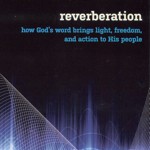 Reverberation: How God’s Word Brings Light, Freedom, and Action to His People. What is the most effective way to grow a church? It’s not a new methodology or cultural outreach strategy, it’s…the Word of God. In this book, Jonathan Leeman wants you to realize that the Word, working through God’s Spirit, is responsible for the growth of God’s church and we need to trust it! Leeman not only informs and equips the leadership of local churches for greatest effectiveness in their preaching ministry but explains how to translate that into the life of the church throughout the week. The book also deals with two errors – not trusting the Word (resulting in a pragmatic ministry philosophy) and not living in light of the Word, (resulting in a ministry philosophy of “preaching is enough”).
Reverberation: How God’s Word Brings Light, Freedom, and Action to His People. What is the most effective way to grow a church? It’s not a new methodology or cultural outreach strategy, it’s…the Word of God. In this book, Jonathan Leeman wants you to realize that the Word, working through God’s Spirit, is responsible for the growth of God’s church and we need to trust it! Leeman not only informs and equips the leadership of local churches for greatest effectiveness in their preaching ministry but explains how to translate that into the life of the church throughout the week. The book also deals with two errors – not trusting the Word (resulting in a pragmatic ministry philosophy) and not living in light of the Word, (resulting in a ministry philosophy of “preaching is enough”).
Reverberation explains the pulpit ministry and traces the theme of how the Word continues through the life of the church. Both theological and practical, Reverberation focuses on how the church hears, responds, discusses, implements and is transformed by the Word. No high-octane production, superstar personalities, or postmodern entreaties, just stuff that is really old, really good, and really powerful!
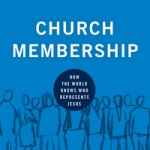 Church Membership: How the World Knows Who Represents Jesus. Why should you join a church? Becoming a member of a church is an important, and often neglected, part of the Christian life. Yet the trend these days is one of shunning the practice of organized religion and showing a distaste or fear of commitment, especially of institutions. Jonathan Leeman addresses these issues with a straightforward explanation of what church membership is and why it’s important. Giving the local church its proper due, Leeman has built a compelling case for committing to the local body.
Church Membership: How the World Knows Who Represents Jesus. Why should you join a church? Becoming a member of a church is an important, and often neglected, part of the Christian life. Yet the trend these days is one of shunning the practice of organized religion and showing a distaste or fear of commitment, especially of institutions. Jonathan Leeman addresses these issues with a straightforward explanation of what church membership is and why it’s important. Giving the local church its proper due, Leeman has built a compelling case for committing to the local body.
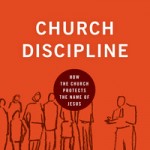 Church Discipline: How the Church Protects the Name of Jesus. Church discipline is essential to building a healthy church. So how exactly do we practice church discipline? Jonathan Leeman helps us face the endless variety of circumstances and sins for which no scriptural case study exists, sins that don’t show up on any list and need a biblical framework to be corrected appropriately in love. Here is a contemporary and concise how-to guide that provides a theological framework for understanding and implementing disciplinary measures in the local church, along with several examples of real-life situations and the corresponding responses.
Church Discipline: How the Church Protects the Name of Jesus. Church discipline is essential to building a healthy church. So how exactly do we practice church discipline? Jonathan Leeman helps us face the endless variety of circumstances and sins for which no scriptural case study exists, sins that don’t show up on any list and need a biblical framework to be corrected appropriately in love. Here is a contemporary and concise how-to guide that provides a theological framework for understanding and implementing disciplinary measures in the local church, along with several examples of real-life situations and the corresponding responses.
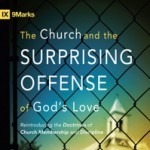 The Church and the Surprising Offense of God’s Love: Reintroducing the Doctrines of Church Membership and Discipline. When the world speaks of “love,” it often means unconditional acceptance. Many churches have adopted this mind-set in their practice of membership and discipline—if they have not done away with such structures entirely. “Yet God’s love and God’s gospel are different than what the world expects,” writes Jonathan Leeman. They’re centered in his character, which draws a clear boundary between what is holy and what is not. It’s this line that the local church should represent in its member practices, because the careful exercise of such authority “is God’s means for guarding the gospel, marking off a people, and thereby defining his love for the world.”
The Church and the Surprising Offense of God’s Love: Reintroducing the Doctrines of Church Membership and Discipline. When the world speaks of “love,” it often means unconditional acceptance. Many churches have adopted this mind-set in their practice of membership and discipline—if they have not done away with such structures entirely. “Yet God’s love and God’s gospel are different than what the world expects,” writes Jonathan Leeman. They’re centered in his character, which draws a clear boundary between what is holy and what is not. It’s this line that the local church should represent in its member practices, because the careful exercise of such authority “is God’s means for guarding the gospel, marking off a people, and thereby defining his love for the world.”
So how should churches receive and dismiss members? How should Christians view their submission to the church? Are there dangers in such submission? The Church and the Surprising Offense of God’s Love responds with biblical, theological, and practical guidance-from both corporate and individual perspectives. It’s a resource that will help pastors and their congregations upend worldly conceptions and recover a biblical understanding and practice of church authority.
5 Theses About God’s Word
Jonathan Leeman’s Reverberation just might be the best recent publication you haven’t heard of. Carl Trueman, whose endorsement is never glib, is right to say, “This book . . . should be read by pastors, elders, and, indeed, church members.”
Leeman’s burden is to show that “one thing is necessary in our churches – hearing God’s Word through preaching, reading, singing, and praying.” The book powerfully illustrates how the ministry of the Word begins in the pulpit and then reverberates throughout the life of the church as members echo back that word to each other in the ordinary elements of life.
5 RELIABLE STATEMENTS
Before unpacking the more practical realities of the life of the word in the life of the church Leeman offers “five statements that will be foundational for everything else in this book.” Theology before doxology is oh so right.
Because every pastor needs to continually remind himself that God’s word is sufficient for all faith and life – even the growth of a church – consider the five theses along with some choice quotes.
1. God’s Word is an Extension of God. “To hear His words that comprise the whole Bible is to hear Him. To obey His words is to obey Him. To ignore His words is to ignore Him.” “You can measure a person’s opinion of God by his or her opinion of God’s word. That’s why a person who loves God loves His word, and the person who hates God rejects what God has spoken. God’s word is an extension of Himself – His identity, purposes, affections, and power.”
2. God Acts through His Word. “God acts when He speaks. He acts in three ways: He creates, He sustains, and He both establishes and breaks relationships.”
3. God Acts through His Word by His Spirit.“God’s words have power because they move by God’s spirit and do exactly what the Spirit wishes.” “There is no greater power a church has at its disposal than preaching the Father’s Word of the Son working through the Spirit.”
4. God’s Word and Spirit Act Together Efficaciously. “Combined, the Word and Spirit make a difference.” “God’s word does not merely impart information; it creates life. It’s not only descriptive; it’s effective. It produces worship, obedience, communion, and disciples.”
5. God Speaks through Human Preachers and Human Words.“When sending seventy-two disciples out to preach, Jesus tells them, ‘The one who hears you hears me, and the one who rejects you rejects me, and the one who rejects me rejects him who sent me” (Luke 10:16). “God’s Word, working through God’s Spirit, is the most powerful force in the universe and in the church. Father, Son, and Spirit wonderfully conspire to pour forth their power through speech, to accomplish their single will through words.”
MINISTERS OF WHAT?
Dear pastor, remember what you are: a minister of the word. The Word that is able, in and of itself, to creates, sustain, and empower your church’s ministry. Give yourself over to the study of this word. Wash your congregation with the water of God’s word . . . and watch it grow.
18 Tips to Help Your Congregation Sing
I love 9Marks. Their resources are continually thought provoking and oh so useful, and the latest edition of the 9Marks Journal, “The Church Singing“, is no exception.
The father and son duo of David and Jonathan Leeman offer an article entitled “My Congregation Barely Sings; How Can I Help?” and it is striking in practical wisdom. They write,
If church leaders want congregations that will really “speak to one another in psalms, hymns, and spiritual songs” (Eph. 5:19), they will have to work at it. They will have to try things that might seem strange or unnatural for people who are accustomed to sitting quietly and watching the performance on stage. Here are a few tips, many of which, no doubt, fall into the realm of prudence.
But they don’t actually provide just a few tips, they provide 18 of them! All 18 are sound, but here are two of my favorites:
Choose “congregational” rather than “performance” songs. Here is a general (not absolute) principle: the more a song depends on the musical accompaniment and cannot be sung by a couple of children in the car on the way home, the more performance-oriented and less congregational it probably is. Congregational songs tend to have singable and memorable melodies. Just because a Christian artist has created something wonderful does not mean it is appropriate for the congregation. The melody may not be very melodic. It may be too high, too low, or wide of range. It may be too rhythmic, perhaps syncopated in a way that’s difficult for untrained singers. It may be too complex through bridges, tags, or multiple keys. Such music might sound wonderful with the recorded accompaniment. Maybe the praise band can perform it just fine. But the more a congregation needs the musicians up front to get through a song, the more you can expect them to mouth the words while watching the band do its thing.
Regularly remind the congregation that they are the primary instrument in corporate worship. If they don’t sing with gusto, musical worship won’t happen. That doesn’t mean acting like a cheerleader at a pep-rally: “Okay, let’s really sing…I want to hear you…I know you can sing louder!” Such leadership detracts from the seriousness of the music, and doesn’t treat their singing as a genuine spiritual expression of love, thanksgiving, and praise. Ultimately, congregational singing should be as natural as words of awe before an unusual sunset, or words of mourning with a hurting friend. Still, congregations must be taught that it is their responsibility to sing, and to teach one another through song. They must be taught to gather expecting to sing.
Head on over to the 9Marks site and read all 18 for yourself.
A Series Worth Serious Investment
Crossway has partnered with 9Marks for a series of books entitled “Building Healthy Churches,” they are an expansion of Dever’s incredibly useful 9 Marks of a Healthy Church. Each entry elaborates on one of the nine marks in a short and readable book.
If the first three books already published are a faithful representation of what’s to come, the Building Healthy Churches series will be one of the most useful resources available for the church – members and leaders alike. Here are the books already in print or soon to be in print.1
9MARKS: BUILDING HEALTHY CHURCHES
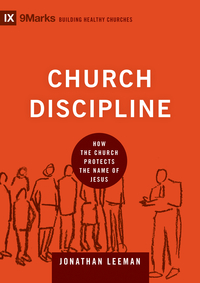 Church Discipline: How the Church Protects the Name of Jesus by Jonathan Leeman. “Church discipline is essential to building a healthy church. So how exactly do we practice church discipline? Jonathan Leeman helps us face the endless variety of circumstances and sins for which no scriptural case study exists, sins that don’t show up on any list and need a biblical framework to be corrected appropriately in love. Here is a contemporary and concise how-to guide that provides a theological framework for understanding and implementing disciplinary measures in the local church, along with several examples of real-life situations and the corresponding responses.”
Church Discipline: How the Church Protects the Name of Jesus by Jonathan Leeman. “Church discipline is essential to building a healthy church. So how exactly do we practice church discipline? Jonathan Leeman helps us face the endless variety of circumstances and sins for which no scriptural case study exists, sins that don’t show up on any list and need a biblical framework to be corrected appropriately in love. Here is a contemporary and concise how-to guide that provides a theological framework for understanding and implementing disciplinary measures in the local church, along with several examples of real-life situations and the corresponding responses.”
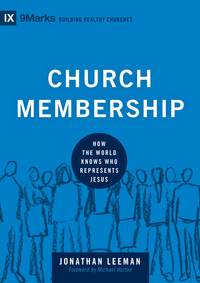 Church Membership: How the World Knows Who Represents Jesus by Jonathan Leeman. “Why should you join a church? Becoming a member of a church is an important, and often neglected, part of the Christian life. Yet the trend these days is one of shunning the practice of organized religion and showing a distaste or fear of commitment, especially of institutions. Jonathan Leeman addresses these issues with a straightforward explanation of what church membership is and why it’s important. Giving the local church its proper due, Leeman has built a compelling case for committing to the local body.”
Church Membership: How the World Knows Who Represents Jesus by Jonathan Leeman. “Why should you join a church? Becoming a member of a church is an important, and often neglected, part of the Christian life. Yet the trend these days is one of shunning the practice of organized religion and showing a distaste or fear of commitment, especially of institutions. Jonathan Leeman addresses these issues with a straightforward explanation of what church membership is and why it’s important. Giving the local church its proper due, Leeman has built a compelling case for committing to the local body.”
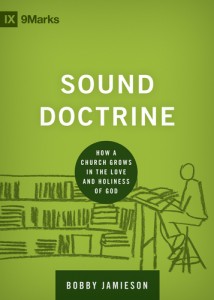 Sound Doctrine: How a Church Grows in the Love and Holiness of God by Bobby Jamieson. “How do you feel about doctrine? Whatever answer comes to mind, this book will not only convince you that sound doctrine is vital for living a godly life, it will also explain the essential role of theology in the life of a healthy church. After all, thinking rightly about God affects everything, from guiding us in practical issues to growing a church’s unity and witness. This short, readable book shows how good theology leads to transformation, life, and joy.”
Sound Doctrine: How a Church Grows in the Love and Holiness of God by Bobby Jamieson. “How do you feel about doctrine? Whatever answer comes to mind, this book will not only convince you that sound doctrine is vital for living a godly life, it will also explain the essential role of theology in the life of a healthy church. After all, thinking rightly about God affects everything, from guiding us in practical issues to growing a church’s unity and witness. This short, readable book shows how good theology leads to transformation, life, and joy.”
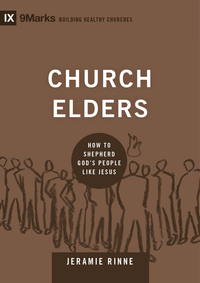 Church Elders: How to Shepherd God’s People Like Jesus by Jeramie Rennie. “What does effective church leadership look like? In this conversational book, Pastor Jeramie Rinne sets forth an easy-to-understand “job description” for elders drawn from the Bible’s teaching on church leadership. Offering practical guidance for new elders and helping church members better understand and support their spiritual leaders, this succinct volume will encourage elders to embrace their calling with grace, wisdom, and clarity of vision.”
Church Elders: How to Shepherd God’s People Like Jesus by Jeramie Rennie. “What does effective church leadership look like? In this conversational book, Pastor Jeramie Rinne sets forth an easy-to-understand “job description” for elders drawn from the Bible’s teaching on church leadership. Offering practical guidance for new elders and helping church members better understand and support their spiritual leaders, this succinct volume will encourage elders to embrace their calling with grace, wisdom, and clarity of vision.”
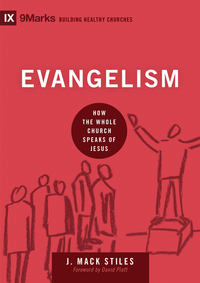 Evangelism: How the Whole Church Speaks of Jesus by Mack Stiles. “Evangelism is more than a program. Every few years, churches jump into the latest evangelistic fad. Leaders administrate the new program, and members go on a raid. But picture a church where evangelism is just part of the culture. Leaders share their faith consistently and openly. Members follow, encouraging one another to make evangelism an ongoing way of life. Such is the way of evangelism presented by this brief and compelling book. No program here. Instead, it just might give your church a new way to live and share the gospel together.”
Evangelism: How the Whole Church Speaks of Jesus by Mack Stiles. “Evangelism is more than a program. Every few years, churches jump into the latest evangelistic fad. Leaders administrate the new program, and members go on a raid. But picture a church where evangelism is just part of the culture. Leaders share their faith consistently and openly. Members follow, encouraging one another to make evangelism an ongoing way of life. Such is the way of evangelism presented by this brief and compelling book. No program here. Instead, it just might give your church a new way to live and share the gospel together.”
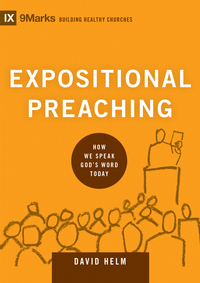 Expositional Preaching: How We Speak God’s Word Today by David Helm. “What makes for good preaching? In this accessible volume—written for preachers and preachers in training—pastor David Helm outlines what must be believed and accomplished to become a faithful expositor of God’s Word. In addition to offering practical, step-by-step guidance for preachers, this short book will equip all of us to recognize good preaching when we hear it.”
Expositional Preaching: How We Speak God’s Word Today by David Helm. “What makes for good preaching? In this accessible volume—written for preachers and preachers in training—pastor David Helm outlines what must be believed and accomplished to become a faithful expositor of God’s Word. In addition to offering practical, step-by-step guidance for preachers, this short book will equip all of us to recognize good preaching when we hear it.”
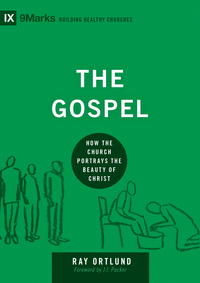 The Gospel: How the Church Portrays the Beauty of Christ by Ray Ortland. “How does the church portray the beauty of Christ? The gospel is a theological message. But this message also creates human beauty—beautiful relationships in our churches, making the glory of Christ visible in the world today. In this timely book, Pastor Ray Ortlund makes the case that gospel doctrine creates a gospel culture. In too many of our churches, it is the beauty of a gospel culture that is the missing piece of the puzzle. But when the gospel is allowed to exert its full power, a church becomes radiant with the glory of Christ.”
The Gospel: How the Church Portrays the Beauty of Christ by Ray Ortland. “How does the church portray the beauty of Christ? The gospel is a theological message. But this message also creates human beauty—beautiful relationships in our churches, making the glory of Christ visible in the world today. In this timely book, Pastor Ray Ortlund makes the case that gospel doctrine creates a gospel culture. In too many of our churches, it is the beauty of a gospel culture that is the missing piece of the puzzle. But when the gospel is allowed to exert its full power, a church becomes radiant with the glory of Christ.”
I hope these book don’t fly under the radar, but are used mightily by God to build His church.
- All descriptions taken from Crossway. ↩


